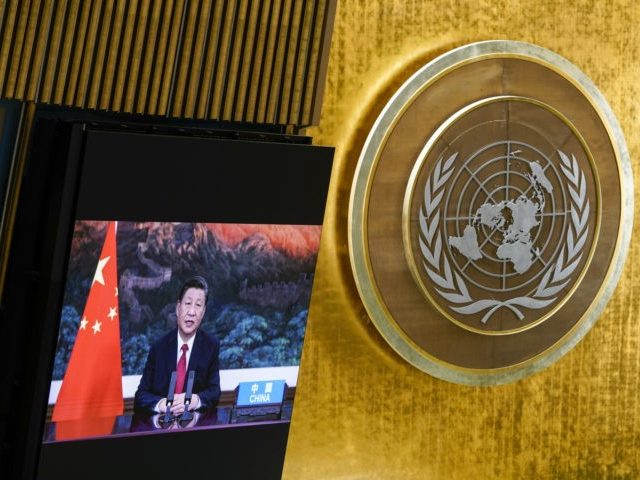Chinese leader Xi Jinping said the 20-year-long U.S. military occupation of Afghanistan that ended last month caused “nothing but harm,” in a wide-ranging speech presented at the 76th session of the U.N. General Assembly on Tuesday.
On Afghanistan:
“Recent developments in the global situation show once again that military intervention from the outside and so-called democratic transformation entail nothing but harm,” Xi said in a thinly veiled reference to Afghanistan during his pre-recorded speech.
The Taliban terror group seized control of Afghanistan on August 15 after deposing Kabul’s U.S.-backed government. The Taliban previously ruled Afghanistan from 1996-2001 before the U.S. invaded the country in the autumn of 2001 and ousted the jihadist terror group from Afghanistan’s government.
America then embarked on a nearly two-decade-long occupation of Afghanistan along with allied forces from the North Atlantic Treaty Organization (N.A.T.O.). The Western military operation attempted to transform Afghanistan into a democratically governed nation and installed its own U.S.-funded administration in Kabul.
The Taliban has swiftly reinstated a system of Islamic law, or sharia, in Afghanistan in the month since its victory over the Western occupation. The Sunni Islam-based organization previously governed Afghanistan through sharia when it was last in power.
On AUKUS:
Xi made an indirect reference in his U.N. speech on Tuesday to a newly announced military alliance between Australia, the U.K., and the U.S. Known as “AUKUS,” the defense pact is seen as a response to China’s increasing presence in the Indo-Pacific region.
“We need to advocate peace, development, equity, justice, democracy and freedom, which are the common values of humanity, and reject the practice of forming small circles or zero-sum games,” Xi advised September 21.
Beijing has recently ramped up its military intimidation of Taiwan and Japan’s Senkaku Islands, which are both located at a strategically important nexus of the East and South China Seas. China has additionally violated the sovereign maritime territory of several nations surrounding the South China Sea over the past several months.
Seeming to address Beijing’s growing military presence in the Indo-Pacific region Tuesday, Xi claimed “China has never and will never invade or bully others, or seek hegemony.”
On Communism:
During his U.N. speech on September 21, Xi Jinping alluded to China’s ruling Communist Party and encouraged the international community to “embrace” not just democracies but socialist forms of governance as well.
“A world of peace and development should embrace civilizations of various forms, and must accommodate diverse paths to modernization,” he said.
Beijing has previously credited the Chinese Communist Party (CCP) with “lifting” hundreds of millions of people out of poverty. Xi Jinping in February claimed the CCP had achieved a “complete victory” over “extreme poverty” in China.
Xi, who also serves as the CCP’s general secretary, “underlined the role of Party leadership, which has provided a ‘political and organizational guarantee’ for China’s poverty alleviation efforts,” in a speech commemorating the alleged achievement on February 25.
On the Chinese coronavirus:
Elsewhere in his U.N. speech Tuesday, Xi addressed an ongoing international investigation into the origins of the Chinese coronavirus.
“China will continue to support and engage in global science-based origins tracing, and stands firmly opposed to political maneuvering in whatever form,” he said.
The Chinese coronavirus first emerged in the central Chinese city of Wuhan in late 2019 before spreading throughout China and beyond the country to the rest of the world, causing a global pandemic that continues to evolve.
Records obtained by the Associated Press in April prove Beijing purposefully downplayed the contagiousness of the then-novel coronavirus in late 2019 and early 2020 as part of its attempts to cover up its failure to contain China’s initial outbreak of the disease in Wuhan.
Additional evidence suggests that the Chinese coronavirus may have emerged from the Wuhan Institute of Virology’s Center for Emerging Infectious Diseases, which studied coronaviruses in bats for years prior to the city’s epidemic.
Documents obtained by the Intercept and published on September 6 prove the U.S. government’s National Institutes of Health (NIH) funded gain-of-function research at the Wuhan Institute of Virology in the years immediately preceding Wuhan’s coronavirus outbreak.
The NIH awarded the lab a $3.1 million grant for the research for a five-year period between 2014 and 2019. The U.S. public health research institution renewed the grant for funding in 2019 but the administration of former U.S. President Donald Trump suspended the grant in April 2020.
The grant proposal included a section stipulating that prior to “further altering the mutant viruses,” the U.S. National Institute of Allergy and Infectious Diseases (NIAID) must be given a “detailed description of the proposed alterations and supporting evidence for the anticipated phenotypics characteristics of each virus.”
The grant documents prove that the director of NIAID, Dr. Anthony Fauci, lied during a U.S. Senate hearing in July when he claimed that the NIH did not fund gain-of-function research at the Wuhan lab.

COMMENTS
Please let us know if you're having issues with commenting.